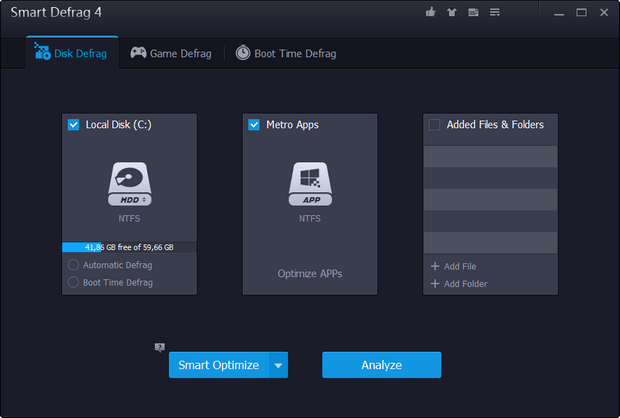Hierbij een quote van How-To Geek over third party defrag utilities, waarbij vooral de tweede alinea interessant is:
It’s impossible to write an article about defrag and not at least mention third-party defrag utilities—but unfortunately we don’t have solid benchmarks to prove that they improve performance better than the default defrag built into Windows. Our general, non-scientific testing has shown that commercial defrag utilities definitely accomplish the task a little better, adding features like boot-time defrag and boot speed optimization that the built-in defrag doesn’t have. They can generally defrag system files a little better, and they usually include tools for defragging the registry as well.
But here’s what they won’t tell you: Over the years, as hard drives have gotten much faster at both sequential and random reads and writes, the usefulness of defrag has dropped a bit. Your hard drive 10 years ago only had to be partially fragmented to cause system slowdown, but these days, it’ll require a very fragmented drive to make that happen. Another factor are the giant hard drives in modern computers, which have enough free space that Windows doesn’t have to fragment your files in order to write them to the drive.
If you’re looking to eek every last drop of performance out of your spinning hard drive, a third-party defrag utility is probably what you need… or you could put that cash towards a new SSD, which would massively increase performance.
Daarbij nog een quote van Microsofts engineering team waarom defragmentatie van SSDs standaard staat uitgeschakeld in Windows:
Windows 7 will disable disk defragmentation on SSD system drives. Because SSDs perform extremely well on random read operations, defragmenting files isn’t helpful enough to warrant the added disk writing defragmentation produces…
….the automatic scheduling of defragmentation will exclude partitions on devices that declare themselves as SSDs.
... en de reden waarom Trim wel degelijk van belang is voor SSDs (en daarom ook standaard staat ingeschakeld bij Windows 8 en 8.1):
A Trim command (commonly typeset as TRIM) allows an operating system to inform a solid-state drive (SSD) which blocks of data are no longer considered in use and can be wiped internally.[1]
Trim was introduced soon after SSDs started to become an affordable alternative to traditional hard disks. Because low-level operation of SSDs differs significantly from hard drives, the typical way in which operating systems handle operations like deletes and formats resulted in unanticipated progressive performance degradation of write operations on SSDs.[2] Trimming enables the SSD to handle garbage collection overhead, which would otherwise significantly slow down future write operations to the involved blocks, in advance.[3]
Bron 1:
http://www.howtogeek.com/...y-need-to-defrag-your-pc/
Bron 2:
http://en.wikipedia.org/wiki/Trim_%28computing%29
Edit: Typos
[Reactie gewijzigd door Bong_Marley op 24 juli 2024 23:33]
 IObit heeft versie 4.1 van Smart Defrag uitgebracht. Met dit gratis programma kunnen de bestanden op de harde schijf worden gedefragmenteerd, wat een gunstige invloed op de prestaties van het systeem kan hebben. Hierbij kijkt Smart Defrag naar welke bestanden vaak worden geopend en welke tijdens het booten van de computer worden gestart, om daaraan dan prioriteit te geven. Net als de andere gratis tools van IObit attendeert dit programma af en toe op het betaalde Advanced SystemCare. De changelog voor versie 4.1 ziet er als volgt uit:
IObit heeft versie 4.1 van Smart Defrag uitgebracht. Met dit gratis programma kunnen de bestanden op de harde schijf worden gedefragmenteerd, wat een gunstige invloed op de prestaties van het systeem kan hebben. Hierbij kijkt Smart Defrag naar welke bestanden vaak worden geopend en welke tijdens het booten van de computer worden gestart, om daaraan dan prioriteit te geven. Net als de andere gratis tools van IObit attendeert dit programma af en toe op het betaalde Advanced SystemCare. De changelog voor versie 4.1 ziet er als volgt uit:

:strip_exif()/i/2002099535.png?f=thumbmedium)